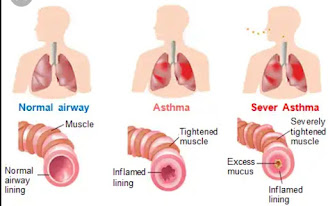| Asthma
(AZ-ma)
is a chronic (long-term) lung disease that inflames and narrows
the airways.
Asthma causes recurring periods of wheezing (a whistling sound when you breathe),
chest tightness, shortness of breath, and coughing. The coughing often occurs
at night or early in the morning. |
Asthma is a lung disease that results in
blockage of the airways. During an asthma attack, the muscles around the bronchi (which
are the small passageways of the lungs) tighten and narrow, making it difficult for air
to leave the lungs.
The chronic inflammation and excessive
sensitivity of the bronchi produce those constricting spasms. The bronchial tubes swell and become plugged
with mucous. An attack, often occurring at night, usually begins as a nonproductive
cough and wheezing, which is often followed by difficult breathing and a tight chest. After
a few hours it subsides.
SYMPTOMS—Difficult
breathing, coughing, wheezing, tight chest. Attacks of multiple symptoms can occur suddenly or gradually.
Sometimes there is coughing with thick, persistent sputum that may be clear or yellow.
There is a feeling of suffocation.
WHAT CAUSES/TRIGGERS ASTHMA?
Attack may be triggered by an allergen
or other irritant, such as chemicals, drugs, dust mites, feathers, food additives, pollutants, fumes, mold,
animal dander, tobacco smoke, etc. But other things can also do it: anxiety, fear, laughing, stress, low blood
sugar, adrenal disorders, temperature changes, extremes of dryness or humidity, or respiratory
infections.
Asthmatics are frequently very sensitive to
foods containing sulfite additives: potassium metabisulfite sulfur dioxide, potassium bisulfite, sodium
bisulfite, etc. Restaurants use them, to prevent discoloration in salads and other foods. Sulfites are
also added to many other foods by the food industry.
Nitrogen dioxide, sulfur dioxide,
ozone, carbon monoxide, hydrocarbons, nitrogen oxide, and cigarette smoke are also known to precipitate
asthma attacks.
Fumes and strong odors, such as
turpentine, paints, gasoline, perfumes, etc., disturb many asthmatics.
Flu Vaccines Lead to Asthma
in infants http://articles.mercola.com/sites/articles/archive/2004/04/14/flu-vaccines-partone.aspx
WHAT TO DO WHEN ASTHMA STRIKES
TAKE THE NATURAL REMEDIES FOR ASTHMA AS LISTED
BELOW
2 c. lemon juice (use fresh
juice when possible) 2 c. honey (best quality)
2 T. vegetable glycerin
1 T. eucalyptus essential oil
Combine and Mix thoroughly.
Adults: Take 2 to 4 Tablespoons 3 times a day. Children: Take 1-2 T. (depending on
age) 3 times a day.
OR
1 dropper lobelia tincture
2 dropper's mullein
Put in a cup with 1 ½ inches
of warm water and drink.
½ c. olive oil
2 drops eucalyptus oil
2 drops peppermint oil
Mix together and rub on chest,
back and bottom of feet













ليست هناك تعليقات:
إرسال تعليق